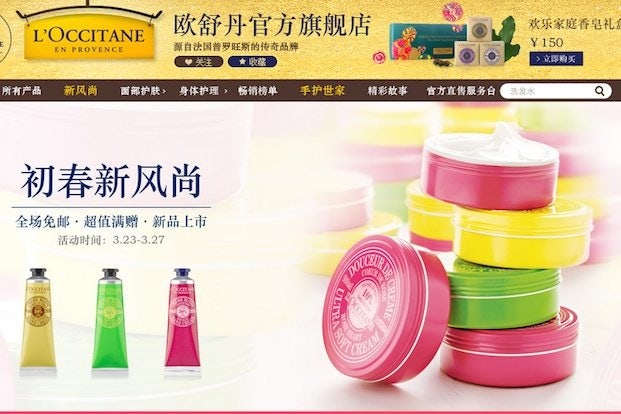
L'Occitane's Tmall site.
Less than a year after the likes of Burberry, L’Occitane, and Estée Lauder launched official “flagships” on the platform, this month Alibaba-owned e-tailer Tmall announced new “invite-only” regulations that limit new stores to hand-picked brands. These new regulations present an unexpected obstacle for companies debating whether to join the platform, which—despite concerns about gray market and counterfeit vendors—is an increasingly effective way to tap emerging consumers throughout China.
Announced on March 2, Tmall’s new regulations come at a time when the e-tail giant (and parent company Alibaba) are under pressure to address continued sales of counterfeits by Tmall vendors, as well as allegations of “brushing” (fake sales) on the site. In response, Tmall enacted the invitation-only policy and laid out plans to put in place an anti-brushing mechanism, with Alibaba saying it will “utilize technology like data mining and big data to scrub our platforms of these activities."
While it remains to be seen whether these are temporary measures, the fact is that brands now need to contend with the new regulations—complicating an already challenging e-commerce market.
Although the number of high-profile Western brands selling on Tmall remains relatively low, interest has only increased in the past year in the wake of Alibaba’s historic IPO, particularly among smaller boutique brands. As such, these new regulations put small brands in a tough situation—since they could, until recently, sign up on their own via Tmall Global yet now must use authorized “Tmall Partners” (TPs), who have existing relationships with Tmall and can smooth the path to gaining an invitation.
This adds two complications into the mix: cost and trust. An entire cottage industry of Tmall Partners now exists, with a multitude of large and small players in the space. For smaller brands, or those newer to the China market, this means finding a cost-effective and trustworthy Tmall Partner is crucial to save precious budget and ensure the partner has the brand’s best interest in mind.
While no shortcut to finding the right partner currently exists, the best way to move ahead is to get referrals from existing networks. Failing that, it pays to do as much research as possible and look into a number of Tmall Partners before deciding which to go with. In general, expect to be asked to pay an up-front setup fee (typically in the range of $10,000-$15,000) and an additional commission on sales.
While less than ideal from a cost perspective, considering the ever-changing nature of working with Tmall, opting for a third-party partner—although it presents its own headaches—can potentially save trouble down the road.
Avery Booker is a partner at China Luxury Advisors.
